Air Cargo Screening
At Hand
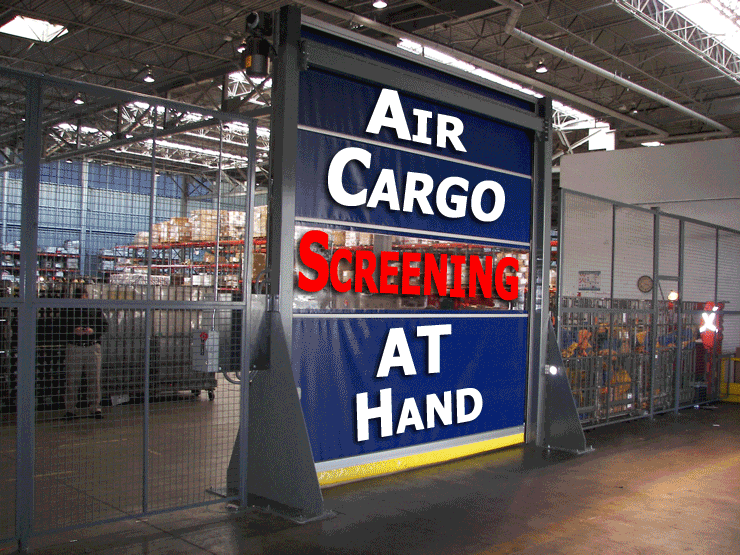
In The Picture WFS LAX facility encloses consignments
in fencing and automatic roll-up and close doors installed as
part of enhanced security project. LAX is also live CCSF.
|
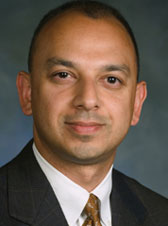 “We
are well prepared for August 1st and actually set an internal target.
We have been screening at 96 percent since July 1st, with the balance
being unscreened shipper built units that will no longer be accepted
after July 29th. “We
are well prepared for August 1st and actually set an internal target.
We have been screening at 96 percent since July 1st, with the balance
being unscreened shipper built units that will no longer be accepted
after July 29th.
“Total 100 percent screening for
air cargo has obviously been a huge challenge, but at the end of the
day Delta Air Cargo met the challenge.
“I do look forward to seeing many
more forwarders join the CCSP program as this will be the best long
term solution,” says Neel Shah, (left) Vice President and top
executive at Delta Air Cargo.
 Jimmy
Speas Director, Cargo Sales US Airways lays it on the line: Jimmy
Speas Director, Cargo Sales US Airways lays it on the line:
Asked what are you saying to customers
he states:
“At this time US Airways feels it
is well prepared with additional resources to comply with the 100% screening
mandate.
“We have worked closely with TSA
and other organizations to prepare for this change.
“US Airways is employing state of
the art screening technology and adding resources at key locations in
order to minimize any customer concerns.
“We believe we have a good plan
and are ready for the mandate.
“US Airways fully supports and highly
encourages customers to participate in the TSA’s Certified Cargo
Screening Program.
“Our Cargo Contact Center is available
24 hours a day, 7 days a week at 1-888-300-0099 to respond to customers'
questions regarding Aug 1 100% cargo screening mandate.”
We are less than ten days away from the
implementation of 100 percent screening of all cargo aboard USA passenger
flights; while there are many views on the subject, all agree on one
important point:
When it comes to what goes on below decks,
business as usual is changed forever.
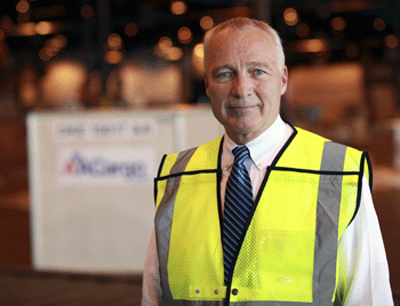 Doug
Brittin, (left)General Manager Cargo at TSA said the process for screening
every piece of cargo is challenging, but his biggest concern is unscreened
cargo coming into the United States on international passenger flights. Doug
Brittin, (left)General Manager Cargo at TSA said the process for screening
every piece of cargo is challenging, but his biggest concern is unscreened
cargo coming into the United States on international passenger flights.
"If we required the airlines to screen
100 percent of cargo overseas, they would be taking everything apart
on their docks and that would cause a significant delay in commerce
and (we would) have a significant uproar over that," Mr. Brittin
told reporters.
Doug Brittin believes it will be some
time before foreign governments work with the United States to ensure
all cargo is screened.
Most questions about 100 percent screening
have been raised by politicians after the publishing of a U.S. General
Accounting Office (GAO) report, presented last month, which made headlines
at a big Homeland Security hearing in the U.S. House of Representatives
in Washington, DC.
GAO warned TSA of possible challenges
to meeting the 100 percent cargo screening requirement.
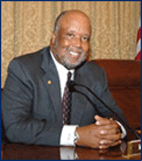 The
GAO report prompted Chairman Bennie Thompson (D-Miss) to comment after
the hearings: The
GAO report prompted Chairman Bennie Thompson (D-Miss) to comment after
the hearings:
“TSA’s ability to conduct
appropriate oversight, inspection and regulation of the screening program
raises serious concerns.
“While it has developed several
initiatives to implement the 100 percent cargo screening mandate, its
programs rely too heavily on private sector participation and self reporting
of data.”
Rep. Ed Markey (D-MA), the author of the
mandate implementing the required screening of all air cargo on passenger
planes (on recommendation of the 9/11 Commission), also chimed in:
“There are serious concerns about
TSA’s system for screening all cargo carried on passenger planes,
a vital security protection.
”The recent GAO report calls into
question whether TSA’s system will be capable of meeting the August
deadline without impeding commerce.
“TSA will also miss the law’s
deadline for screening all cargo on passenger planes entering our country
from overseas. This is particularly troubling given the threats posed
by terrorists like the Christmas Day underwear bomber, who was attempting
to enter our country on a passenger plane, which originated overseas.
“We must resolve all outstanding
issues to ensure that we are focused not only on the safety of passengers
in airline seats, but of the cargo just beneath their feet.”

“Merchants that
have business in catalogs, goods and other mail services materials
screened at their local airport, are likely to experience significant
delays, cargo backlogs and transit time increases,” says
Pitney Bowes Rob DiVincenzo.
“We have been working in
the TSA program that allows cargo to be pre-screened through
vetted and audited facilities.
“We are eager to share our
knowledge about how the retail industry can prepare for the
upcoming mandate and the changes in screening and shipping routines
that should be expected,” DiVincenzo says.
Contact: Toll-Free: (800) 355-9090. www.pb.com/mailservices
|
 Back down on the ground: for Klaus Holler,
Head of Area Management Americas at Lufthansa Cargo, the deadline to
100 percent screening of air cargo, while looming to some, has held
a very special place in the Lufthansa Cargo plan of moving forward.
Back down on the ground: for Klaus Holler,
Head of Area Management Americas at Lufthansa Cargo, the deadline to
100 percent screening of air cargo, while looming to some, has held
a very special place in the Lufthansa Cargo plan of moving forward.
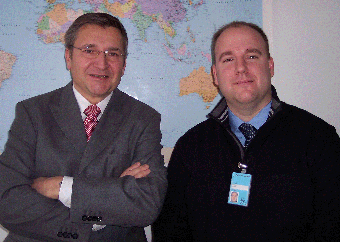 It
was Lufthansa Cargo, after all, that hosted several open format Security
Conferences both in the USA and in Germany during the past two years.
They were conducted by the carrier’s cargo security chief, Harald
Zielinski, (left) pictured here with James LoBello, Head of Security
Lufthansa USA. It
was Lufthansa Cargo, after all, that hosted several open format Security
Conferences both in the USA and in Germany during the past two years.
They were conducted by the carrier’s cargo security chief, Harald
Zielinski, (left) pictured here with James LoBello, Head of Security
Lufthansa USA.
Mr. Holler (right) told Air
Cargo News FlyingTypers:
“Lufthansa Cargo has been at 100
percent mandated screening since July 1, a month before the deadline.”
Speaking from Atlanta, Mr. Holler added:
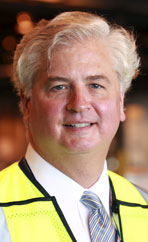 “The
idea to move to 100 percent screening before the deadline and be able
to maintain the integrity of our various closeout timetables is quite
serious business around here. “The
idea to move to 100 percent screening before the deadline and be able
to maintain the integrity of our various closeout timetables is quite
serious business around here.
“We want to be absolutely certain
that everyone is on the same page with total transparency all around.
“Sure, we expect some tweaking will
need to be applied to get things right, but our goal is to make sure
the transition to 100 percent goes smoothly for everyone.”
As reported here earlier this week, American
Airlines is also ramping up its public awareness outreach as August
1 approaches.
Dave Brooks, AA Cargo President, said:
"We've been stepping up the screening
that we have been doing in the air freight environment for three years
now, so I don't expect life to be that much different August 1 or August
2.”
American Airlines held a demonstration
of new x-ray machines and Explosive Trace Detection technology last
week in Dallas. (click
for related story).
Geoffrey/Flossie
|




 Back down on the ground: for Klaus Holler,
Head of Area Management Americas at Lufthansa Cargo, the deadline to
100 percent screening of air cargo, while looming to some, has held
a very special place in the Lufthansa Cargo plan of moving forward.
Back down on the ground: for Klaus Holler,
Head of Area Management Americas at Lufthansa Cargo, the deadline to
100 percent screening of air cargo, while looming to some, has held
a very special place in the Lufthansa Cargo plan of moving forward. It
was Lufthansa Cargo, after all, that hosted several open format Security
Conferences both in the USA and in Germany during the past two years.
They were conducted by the carrier’s cargo security chief, Harald
Zielinski, (left) pictured here with James LoBello, Head of Security
Lufthansa USA.
It
was Lufthansa Cargo, after all, that hosted several open format Security
Conferences both in the USA and in Germany during the past two years.
They were conducted by the carrier’s cargo security chief, Harald
Zielinski, (left) pictured here with James LoBello, Head of Security
Lufthansa USA. “The
idea to move to 100 percent screening before the deadline and be able
to maintain the integrity of our various closeout timetables is quite
serious business around here.
“The
idea to move to 100 percent screening before the deadline and be able
to maintain the integrity of our various closeout timetables is quite
serious business around here.